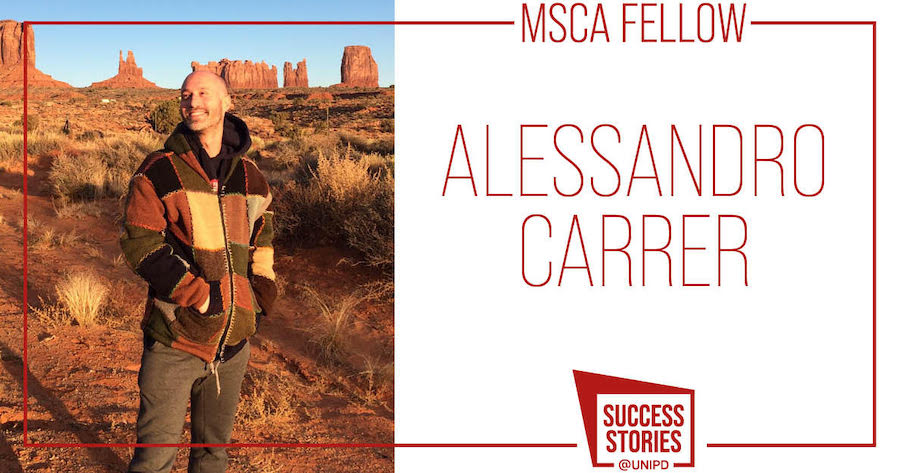
MSCA Fellow: Alessandro Carrer
Going abroad to look at your country through a different lens: the experience of a researcher on the move

Alessandro Carrer graduated and obtained his PhD degree from the University of Trieste working in the laboratory of Molecular Medicine at the International Center for Genetic Engineering and Biotechnology (ICGEB). At that time, his research focus was on neovessel formation in tumors. Later, he decided to move abroad to study tumor metabolism and joined the University of Pennsylvania, Philadelphia, USA as a postdoc.
He returns to Italy as an MSCA fellow to study the role of the mitochondrial protein OPA1 in pancreatic cancer initiation and to develop novel strategies to tackle disease onset. His project is based at the Department of Biology under the supervision of Prof. Luca Scorrano.
Alessandro, can you tell us why you decided to become a researcher and how you have been developing your research career?
I have always been fascinated by the idea of being a researcher and, after my graduate studies in medical biotechnologies at the University of Trieste, I decided to undertake a PhD at the same lab where I did my Master thesis, that is, the International Center of Genetic Engineering and Biotechnology in Trieste. It is a big and international environment and I had a special work and life experience there. I literally got stuck in research and I spent ten years in the Institute, working on neovessel formation in tumors. I then decided to prove myself in a different research environment abroad and I chose to go to a small lab in Philadelphia - University of Pennsylvania, USA, where I had the opportunity to specialise in tumor metabolism. Shifting from my previous research topic, I figured tumor metabolism was exactly what I wanted to work on. I spent four years as a postdoc and two as a Research Assistant and then I decided to go back to Italy and find an independent position in Academia.
What did you learn during your seven-year experience abroad?
The experience I had abroad enriched me from a professional and personal point of view. When you move from your country you realize what you miss most and you learn to look at your home country through a lens – and this lens makes you see what is beautiful and what is wrong. It is important to get in touch with different research and life environments because they help you to become more flexible: you learn to do several things, in different contexts.
Why did you choose the University of Padua when you decided to come back from the US? How did you meet your supervisor, Luca Scorrano?
In Philadelphia I specialised in tumor metabolism and I wanted to keep on working on this topic. The University of Padua, in collaboration with VIMM, the Veneto Institute of Molecular Medicine, is an outstanding place for this research area. I did not know personally Luca before writing him an email and asking him if he could host me in his lab. He asked me to do a seminar in Padua and in that occasion I started the collaboration with him and Marco Sandri. I first came to Padua thanks to an AIRC funding and later started my MSCA Individual Fellowship.
Along your career, you have successfully competed for several grants; what makes the MSCA Individual Fellowship funding different from all others? Why did you decide to apply for it?
First of all, I considered the MSCA-IF the best funding scheme for my reintegration to Europe. Secondly, what has impressed me is the community dimension of the MSCA; there is an international network of MSCA Fellows (the Marie Curie Alumni Association) that provides for a sort of social identity. I would also like to underline two peculiar elements requested in the project: 1) the communication and dissemination activities, strongly encouraged throughout the duration of the project, and 2) the so called “two-way transfer of knowledge” between the researcher and the host, which has been crucial in my experience: I brought knowledge and skills to Padua labs and I received a lot in return as well. To make the two-way transfer work, it is essential to choose an excellent supervisor.
About the supervision activities, you have gained some experience in supervising students and PhDs. How important is it to be a supervisor for the development of a researcher’s career?
I used to mentor students and PhDs during their secondment and their studies in the lab in Philadelphia, and, if I project myself in the future, I can see myself manage my own research team, including PhDs and postdocs. However, you do not receive training to be a supervisor and the management of a research group may be quite complex. You should have a mentor who helps you becoming a mentor yourself!
International Research Office
via Martiri della libertà 8, 35137 Padova, Italy
tel. +39 049.827 1947 / 1948 / 1945
fax +39 049.827 1911
international.research@unipd.it


